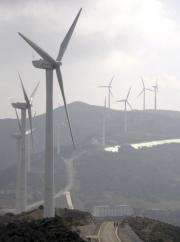China a surprise leader in clean energy: study

The world's top polluter, China, is a surprise leader in clean energy efforts, a study showed Tuesday, outstripping the United States and Japan and leaving Australia lagging far behind.
The Vivid Economics report, commissioned by Australia's Climate Institute thinktank, showed China was second only to Britain in the value of its incentives to cut pollution from electricity generation.
Britain's efforts were estimated at 29.30 US dollars per tonne of carbon to China's 14.20 US dollars, with the United States clocking 5.10, Japan 3.10, Australia 1.70 and just 70 US cents for South Korea.
The six countries account for just under half of all global emissions.
"The Chinese leadership have made a strategic decision that they missed out on the last two industrial revolutions and they don't want to miss out on the third one," said Erwin Jackson, director of the Climate Institute, of China's "surprising" dominance.
"They are now commanding the largest market share of clean energy investment at a global level as a result," Jackson told AFP.
China's investment in clean energy topped 35 billion US dollars in 2009 compared with 11 billion in Britain and 18 billion in the United States, and Jackson said it was set to increase tenfold over the next decade.
The main driver of China's performance was its commitment to shutting down more than 100 small coal-fired power plants for cleaner coal stations by 2011, which the report said would reduce emissions by 15 percent.
It also offered subsidies worth billions of yuan for green energy projects, aiming to generate 15 percent of the nation's total energy from renewable sources by 2020.
In Japan, 10 major power producers had joined a voluntary scheme aiming to cut emissions by 20 percent of 1990 levels by 2012, a major initiative which accounted for more than half of its clean energy rating.
Variations of an emissions cap-and-trade system were in place in South Korea, Britain, Tokyo, and parts of the United States, the report said.
The study said there were few policies which applied directly to coal, despite the fact it was the major source of fuel and carbon pollution for the six countries.
It also warned that none of the countries was on track to meet reduction targets agreed after last year's global climate summit at Copenhagen, with Japan lagging worst in relative terms.
Jackson said the report showed that Europe and China were ahead of the game on pollution reduction investment, far outpacing countries such as Australia -- the world's worst per capita polluter due to its heavy dependence on coal.
Without action to price carbon, he said Australia risked falling foul of anti-pollution taxes, with countries such as Japan and India already taxing imports of coal and similar moves foreshadowed in the United States and Europe.
Australian Climate Change Minister Greg Combet welcomed the report, saying a carbon price "will not only provide an incentive to reduce pollution but also ... drive this country's long-term competitiveness".
The ruling Labor party in Australia, the world's largest coal exporter, has shelved emissions trading laws after failing to pass them and nearly lost power at August polls, with the eco-minded Greens party winning a record vote share.
Prime Minister Julia Gillard, now at the head of a Greens-backed coalition government, has urged penalties for carbon pollution and formed a cross-party committee to investigate the best way to slash emissions.
(c) 2010 AFP



















